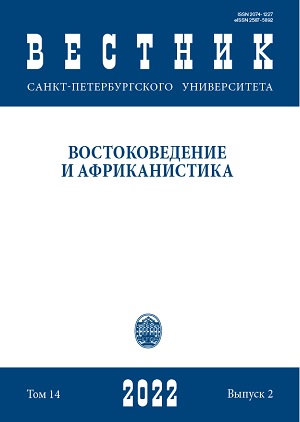Pronouns in Ginyanga
DOI:
https://doi.org/10.21638/spbu13.2022.206Abstract
The paper presents a tentative overview of pronouns in Ginyanga, an understudied Kwa language spoken in Togo and Ghana; in particular, personal pronouns, reflexive pronouns, demonstratives, and quantifiers. There are no subject pronouns in Ginyanga. We define two personal pronoun series with a designated pronoun for each noun class: basic (emphatic and possessive) and object. The basic set of pronouns is used in independent and possessive contexts, as well as in reflexive constructions. The overview of Guang pronoun systems shows that Ginyanga falls into the typical Guang pattern. Possessive pronouns of the 1st (human) class exhibit some irregularities when used with kinship terms. In some cases, the morphological agreement pattern between a noun and its coreferential object pronoun can be violated on a semantic basis, e. g. human referents of non-human noun classes. Additionally, there is some variation in usage of object pronoun series by different consultants of different age groups, which may be an indication of language change. There are two demonstratives, -balɪ “this” and -bʊnʊ “that”, also subject to class agreement. In contrast to -balɪ, the demonstrative -bʊnʊ is also used in relative clauses and can be anaphoric. The majority of quantifiers demonstrate no class agreement. The only exceptions in our data are -kʊ “one” and kpɛkpɛ “each”.
Keywords:
Niger-Congo, Kwa, Guang, noun class, noun morphology, pronouns
Downloads
References
Downloads
Published
How to Cite
Issue
Section
License
Articles of "Vestnik of Saint Petersburg University. Asian and African Studies" are open access distributed under the terms of the License Agreement with Saint Petersburg State University, which permits to the authors unrestricted distribution and self-archiving free of charge.





